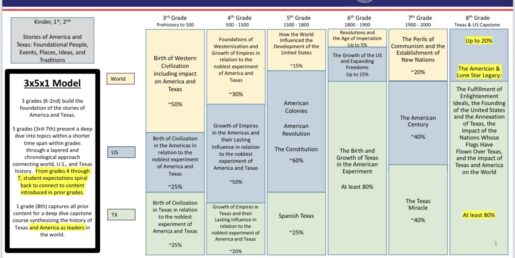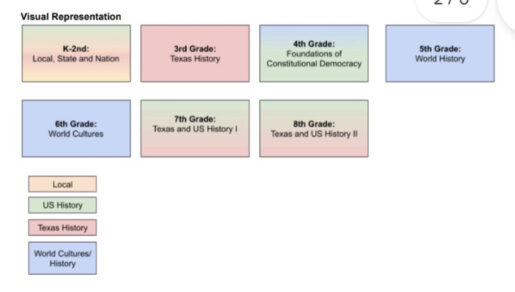The State Board of Education will vote on a new social studies framework Friday, which could change the way students learn Texas History in the classroom.
Texas History is currently taught in fourth and seventh grades. The board will vote September 12 between proposed social studies frameworks, which could rearrange how students learn their Lone Star heritage. Members will decide on more specific course content later.
The first framework, Option G, is a chronological narrative from prehistoric times to present – splitting each year between the history of the world, Texas, and America. It begins third grade with the origin of Western Civilization, and culminates in a U.S. and Texas Capstone in eighth grade.
The second framework, Option D.2, teaches students by subject – from Texas History in third grade, to a blend of Texas and U.S. History in eighth grade.
“It’s come down to those two,” said Board Member Brandon Hall to The Dallas Express. “I don’t see any chance that’s going to change.”
Hall said he supports the first framework, as it would cause Texas History instruction to “increase significantly.”
“Add up the percentages of each year that will have a Texas focus, it adds up to about three years worth of Texas history – whereas we only have two now,” he said.
Former Board Member Pat Hardy told The Dallas Express she didn’t see a need to overhaul the curriculum, instead recommending small adjustments to the current framework. She said most problems in public schools come down to a lack of reading, a lack of discipline, and an emphasis on testing rather than teaching.
Option 1 – Teaching By Chronology

The chronological framework, Option G, is a consistent narrative from prehistoric history to the present.
From kindergarten to second grade, this framework lays a groundwork of “Stories of America and Texas,” with important people, events, places, ideas, and traditions. In third grade, students would begin more rigorous history, learning about the development of Western Civilization and early civilization in America and Texas before 500 A.D.
From fourth to seventh grade, “student expectations spiral back to connect to content introduced in prior grades.” In fourth grade, students would begin discussing the growth of empires in Western Civilization, as well as in America and Texas, from 500 to 1500 A.D. In fifth grade, teachers would discuss the beginnings of America, and Texas under Spanish rule, from 1500 to 1800 A.D.
In sixth grade, they would teach about imperialism and the growth of the Texas and American experiments until 1900. In seventh grade, they would cover “the American century,” “the Texas miracle,” and “the perils of communism and the establishment of new nations.” In eighth grade, students would complete a U.S. and Texas Capstone class, focusing at least 80 percent on Texas history and up to 20 percent on American history.
Hall supported this option and criticized the current curriculum, which he says attempts to teach Texas History and other events as isolated subjects.
“It’s just like we’re trying to learn facts and dates and names to get through it all, and not as many stories that the kids can connect with – how they fit into Texas history,” Hall said.
Andree Balan, a senior curriculum consultant at the nonprofit MacMillan Institute, testified in favor of the plan during a board meeting Wednesday.
She said she was born and raised in communist Romania, so applauded the framework for including education about the dangers of the totalitarian ideology within a “historical sequence.”
“I applaud our effort to educate young Texans regarding communism, its principles and its infrastructure,” Balan said. “Critical thinking about history does not happen in a vacuum.”
Ken Pope, a senior fellow for the Victims of Communism Memorial Foundation, also spoke in support of this option.
“This comprehensive model teaches the arc of history in a way that allows for better understanding of important ideas, events, eras, and people that include the history of socialism and communism,” Pope said.
The Texas Public Policy Foundation issued a paper supporting chronological history education, explaining the importance of demonstrating themes as they play out across time.
The group supported a “classically inspired chronological approach to teaching history that tells the American and Texas stories as part of a bigger world story and hooks back and repeats from grade to grade the most significant ideals, people, and events.”
Option 2 – Teaching By Class

Under Option D.2, students would take classes on different topics throughout history, rather than a chronological approach. This framework would teach Texas History as its own class in third grade, then blend Texas and American history in seventh and eighth grade.
Teachers would educate students about “Local, State and Nation” from kindergarten to second grade. Then they would teach Texas History in third grade, “Foundations of Constitutional Democracy” in fourth grade, and “World History” in fifth grade. In sixth grade, students would learn “World Cultures.” In seventh and eighth grade, they would learn Texas and U.S. History I and II.
This framework also uses a “spiral curriculum approach,” according to the framework description obtained by The Dallas Express. A spiral curriculum means revisiting important concepts multiple times, in deeper complexity, throughout the sequence.
According to the framework description, the sequence would use “logical groupings that align with how concepts naturally interconnect.”
“The course sequence implements a spiral curriculum approach that increases academic rigor while maintaining developmental appropriateness,” the description reads. “Combining geography with culture recognizes their inherent connection, while merging government with civics eliminates artificial separation of related concepts.”
The group behind this framework is the Texas Council for the Social Studies, The Dallas Express has learned.
TCSS said it proposed this sequence in a now-archived webpage. The group also linked to a sequence proposal online, identical to the one Hall said the group sent to him.
“This framework is not a perfect solution, nor will it satisfy every perspective,” the group wrote online. “But it represents both progress and compromise, designed through collaboration between educators, content experts, and stakeholders.”
Hardy, who lost her seat in 2024, told The Dallas Express she is still a member of TCSS but does not always support its actions.
“There is a very left-leaning, progressive attitude in that group,” Hardy said. “They’re not the group of old.”
Hardy said when TCSS worked on curriculum standards in 2022, it tried to include “transgender” topics for eighth graders.
“They got stuff in there, transgender stuff, in eighth grade American history. I’m like, ‘Wait guys, come on, really?’” Hardy said. “I think that, had they had the ability to do that, they would.”
Republican board member Keven Ellis — often criticized by conservatives as a RINO — has faced backlash for siding with Democrats on past curriculum votes. In June, Ellis joined Democrats to renew the Indigenous Studies course, persuading fellow Republicans Evelyn Brooks and Pam Little to support it as well. That decision drew sharp criticism from grassroots groups who argue the course embeds critical race theory concepts and progressive ideology. Early indications suggest Ellis supported the first option, Option G, during a preliminary vote on Wednesday, September 10.
TCSS signed a statement with numerous far-left groups to keep sexually explicit and racially-focused content in school libraries in 2021, denouncing content restrictions as “censorship.”
The group also opposed Texas bills to ban critical race theory (CRT) – a Marxist framework which emphasizes perceived racism in the nation’s laws and society – in 2021, according to the Texas Tribune. Also notably, its Vice President Jennifer Sayed is social studies lead at the Islamic School of Irving.
TCSS pledged to teach members “about equity issues in our classrooms and in our society,” according to a memo obtained by The Dallas Express. The document appears to be from 2020 or earlier, and advertised a book club about “the elements of segregation in our classrooms.”
Board members will vote on the framework options Friday. Then, Texans will have to wait for results. Members will still have to decide on more specific “strands” or themes, course sequences, and main topics and primary sources.


